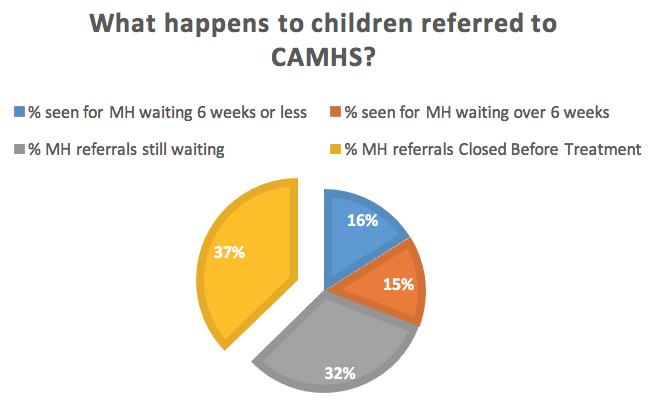Majority of children not receiving mental health treatment within year of referral
Gabriella Jozwiak
Wednesday, November 21, 2018
More than two thirds of the 338,000 children referred to child and adolescent mental health services (CAMHS) in 2017/18 (69 per cent) did not receive treatment within a year, research has found.

Official data obtained by the Children's Commissioner for England shows that 31 per cent - fewer than one in three children - received treatment within 12 months of being referred. Meanwhile, 32 per cent were still on waiting lists at the end of the year.
The largest proportion (37 per cent) were either not accepted for treatment or were discharged following an assessment appointment.
Only half of the children who are actually admitted to CAMHS were seen within six weeks.
However, the analysis did find that some areas are now significantly outperforming NHS England targets and eating disorder services in particular have greatly improved.
The analysis is based on data provided to children's commissioner Anne Longfield following a request under her statutory powers.
The figures highlight a shortfall in funding for services, with the statistics showing that adult mental health services received 15 times more funding than CAMHS (14 per cent of CCGs' overall budget on mental health but only 0.9 per cent on children's mental health).
The study calculates that children's mental health services require an additional £1.7bn a year to achieve equivalent funding.

The report states: "The government has given the NHS a historic 10-year funding settlement, with the Chancellor pledging at least £2bn a year of extra funding for mental health services.
"If children are prioritised by the NHS, it is entirely possible to achieve spending parity."
However, the data does reveal spending on children's mental health is generally increasing, with 134 out of 207 clinical commissioning groups (CCGs) assessed by the study spending more in the area last year.
In England CAMHS spending rose from £49 per head in 2016/17 to £54 in 2017/18 - a 10 per cent increase.
But 72 CCGs in England reported lower spending within the same period. Longfield said the current rate of progress is still not good enough for the majority of children who required help.
She has called on the government to establish a 10-year plan to "set out a vision for children's mental health with clear targets and timetables".
"By 2023, the NHS should be in a position to ensure no child who needs help is turned away," said Longfield.
"There also needs to be a focus on early help. An NHS-funded counsellor in every school, providing a service that is accessible and child-friendly, would be transformative.
"All of this will require funding and leadership, but the prize is worth pursuing, and the NHS 10-year plan is the time to do it."




